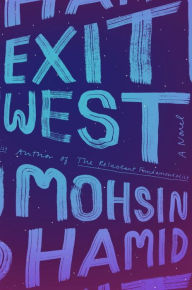
Given the refugee crises around the globe today, it’s hard to imagine a book more timely than Exit West. It’s a novel about identity and migration, community and humanity, and the toll on relationships of living through such trying times.
Saeed and Nadia meet in an evening university class. He’s fairly devout. She’s not, but wears robes anyway to fend off attention. But at the time they meet, their city and country (unnamed in the novel but resembling the author’s home in Lahore, Pakistan) are entering a civil war. The “militants” are rapidly taking over society, leaving Saeed and Nadia feeling they have little choice but to leave.
And it’s at this point the novel takes a strange turn as a series of black doors, or portals, opens up in the city (across the world, in fact) that allow one to “cross over” and arrive in a totally different location. And so people flock to these doors to “exit west” to escape the militants.
The doors are an interesting metaphor for the refugee flight occurring today around the world. People are anxious to cross over to more desirable locations, so those doors are often heavily guarded, but very few people want to go the opposite direction and those doors are rarely guarded.
Saeed and Nadia’s journey through several of these portals paints a vivid portrait of the refugee’s plight and how different countries are reacting to the sudden and unexpected flood of refugees from different cultures.
Exit West is a brief novel at just 230 pages, and at times it wanders back and forth between personal story and philosophical meditation, but it is always interesting, timely, and poignant.
Saeed and Nadia meet in an evening university class. He’s fairly devout. She’s not, but wears robes anyway to fend off attention. But at the time they meet, their city and country (unnamed in the novel but resembling the author’s home in Lahore, Pakistan) are entering a civil war. The “militants” are rapidly taking over society, leaving Saeed and Nadia feeling they have little choice but to leave.
And it’s at this point the novel takes a strange turn as a series of black doors, or portals, opens up in the city (across the world, in fact) that allow one to “cross over” and arrive in a totally different location. And so people flock to these doors to “exit west” to escape the militants.
The doors are an interesting metaphor for the refugee flight occurring today around the world. People are anxious to cross over to more desirable locations, so those doors are often heavily guarded, but very few people want to go the opposite direction and those doors are rarely guarded.
Saeed and Nadia’s journey through several of these portals paints a vivid portrait of the refugee’s plight and how different countries are reacting to the sudden and unexpected flood of refugees from different cultures.
Exit West is a brief novel at just 230 pages, and at times it wanders back and forth between personal story and philosophical meditation, but it is always interesting, timely, and poignant.
 RSS Feed
RSS Feed
